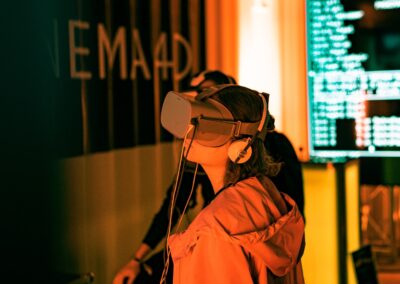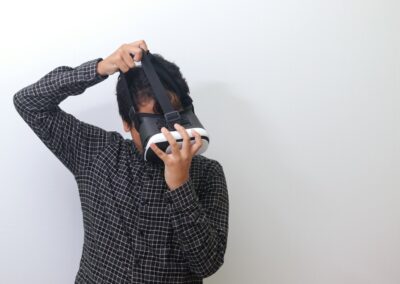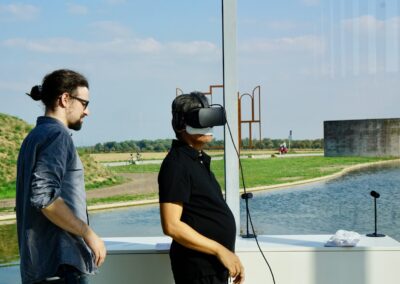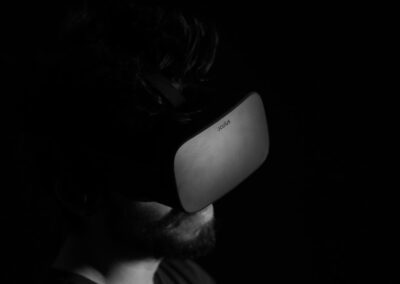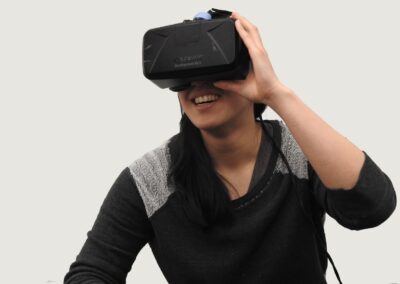Navigating the Complexities of VR Surveillance
The Emergence of VR Surveillance in Saudi Arabia and the UAE
The advent of virtual reality (VR) has opened new frontiers in various fields, including surveillance and monitoring. In progressive regions like Saudi Arabia and the UAE, where technological advancements are rapidly embraced, VR is being integrated into security and monitoring systems to enhance public safety and operational efficiency. Cities like Riyadh and Dubai are leveraging VR to create more immersive and effective surveillance environments, offering unprecedented capabilities for real-time monitoring and data analysis.
In Saudi Arabia, the use of VR in surveillance is part of a broader strategy to enhance urban security and manage large-scale events more effectively. The implementation of VR technologies in Riyadh’s smart city initiatives allows for comprehensive monitoring of public spaces, helping authorities respond swiftly to incidents and ensure public safety. This innovative approach is transforming traditional surveillance methods, providing a more detailed and dynamic view of urban environments.
Similarly, Dubai is at the forefront of adopting VR for surveillance purposes. The Dubai Police Department has incorporated VR into its training programs and operational protocols, enabling officers to simulate various scenarios and improve their response strategies. This integration of VR technology not only enhances the efficiency of law enforcement but also underscores Dubai’s commitment to leveraging modern technology for public safety. However, as these technologies become more prevalent, they also raise significant ethical questions that need to be addressed.
Ethical Dilemmas in VR Surveillance
The use of VR for surveillance and monitoring introduces several ethical dilemmas, primarily revolving around privacy, consent, and the potential for misuse. One of the most pressing concerns is the infringement on individual privacy. VR surveillance systems can collect vast amounts of data, providing detailed insights into people’s movements and behaviors. While this data can enhance security, it also poses a risk of violating individuals’ privacy rights if not managed responsibly.
In Riyadh, policymakers are actively working to balance the benefits of VR surveillance with the need to protect individual privacy. The Saudi Data and Artificial Intelligence Authority (SDAIA) is developing regulations to ensure that surveillance data is collected and used ethically. These regulations emphasize transparency, requiring authorities to inform the public about surveillance activities and the types of data being collected. By promoting transparency, Riyadh aims to build public trust and mitigate concerns about privacy violations.
Another ethical issue is the potential for VR surveillance to be used for unwarranted monitoring and control. In Dubai, the government is implementing strict oversight mechanisms to prevent the misuse of VR technologies. The Dubai Electronic Security Center (DESC) is responsible for ensuring that VR surveillance systems are used solely for legitimate security purposes and not for invasive monitoring of individuals. By establishing clear guidelines and oversight mechanisms, Dubai is taking proactive steps to address the ethical challenges associated with VR surveillance.
Balancing Security and Ethical Considerations
Finding a balance between enhancing security and respecting ethical principles is crucial for the responsible use of VR surveillance. In both Saudi Arabia and the UAE, there is a strong emphasis on creating frameworks that promote ethical practices while leveraging the full potential of VR technologies. These frameworks include rigorous data protection measures, accountability mechanisms, and public engagement initiatives.
In Saudi Arabia, the National Cybersecurity Authority (NCA) plays a pivotal role in ensuring that VR surveillance technologies are deployed ethically. The NCA’s guidelines mandate that all surveillance activities must comply with strict data protection standards, including encryption and access controls. These measures are designed to safeguard the integrity and confidentiality of surveillance data, preventing unauthorized access and misuse. By implementing robust cybersecurity measures, Saudi Arabia is enhancing the ethical deployment of VR surveillance technologies.
Dubai is also committed to upholding ethical standards in the use of VR for surveillance. The Dubai Future Foundation is conducting research on the societal impacts of VR technologies, exploring ways to maximize their benefits while minimizing ethical risks. This research includes consultations with ethicists, technologists, and community leaders to develop comprehensive guidelines for the ethical use of VR surveillance. By fostering a collaborative approach, Dubai is ensuring that ethical considerations are integrated into the development and deployment of VR technologies.
Addressing the Ethical Challenges of VR Surveillance
Developing Ethical Frameworks and Regulations
To effectively address the ethical dilemmas posed by VR surveillance, it is essential to develop robust ethical frameworks and regulations. These frameworks should guide the responsible use of VR technologies, ensuring that they enhance public safety without compromising individual rights. In Saudi Arabia and the UAE, regulatory bodies are actively working to create policies that balance innovation with ethical responsibility.
The Saudi Data and Artificial Intelligence Authority (SDAIA) is leading efforts to establish ethical guidelines for VR surveillance. These guidelines emphasize the importance of transparency, accountability, and user consent. By promoting ethical standards, SDAIA is ensuring that the deployment of VR technologies aligns with Saudi Arabia’s broader goals of fostering innovation while protecting individual rights. This approach sets a precedent for other countries to follow, demonstrating how ethical considerations can be integrated into technological advancement.
In the UAE, the National Artificial Intelligence Strategy includes provisions for the ethical use of VR surveillance. The strategy outlines principles for fair and equitable access to VR technologies, ensuring that all segments of society can benefit from these advancements. By addressing issues such as digital divide and inclusivity, the UAE is promoting a holistic approach to the development of VR surveillance. This ensures that the benefits of VR environments are shared broadly, enhancing social cohesion and equality.
Promoting Public Awareness and Engagement
Public awareness and engagement are crucial for addressing the ethical implications of VR surveillance. By involving the public in discussions about the potential consequences of these technologies, policymakers can build trust and foster a sense of shared responsibility. In Saudi Arabia and the UAE, initiatives are underway to educate the public about VR surveillance and its implications.
In Riyadh, the Ministry of Communications and Information Technology (MCIT) is launching public awareness campaigns to inform citizens about the benefits and risks of VR surveillance. These campaigns aim to provide clear and accessible information, helping individuals make informed decisions about their use of VR technologies. By promoting digital literacy and ethical awareness, Riyadh is empowering its citizens to navigate the complexities of a digital world responsibly.
Dubai is also prioritizing public engagement through initiatives such as the Dubai 10X program, which seeks to involve citizens in the development of future technologies. By hosting workshops, public forums, and hackathons, Dubai is creating opportunities for citizens to contribute to the design and governance of VR surveillance. This participatory approach ensures that the development of VR technologies is inclusive and reflective of diverse perspectives. By fostering public engagement, Dubai is building a more resilient and ethically grounded digital future.
Conclusion
The potential ethical dilemmas posed by the use of virtual reality for surveillance and monitoring are significant and multifaceted. In regions like Saudi Arabia and the UAE, where technological innovation is rapidly advancing, addressing these dilemmas through robust ethical and philosophical frameworks is essential. By developing comprehensive regulations, promoting public awareness, and fostering interdisciplinary collaboration, Riyadh and Dubai are leading the way in ensuring that the benefits of VR surveillance are realized responsibly and equitably. These efforts demonstrate a commitment to harnessing the transformative power of technology while safeguarding fundamental human values.
#VirtualRealityEthics #SurveillanceTechnology #EthicalDilemmas #VRMonitoring #AIinSurveillance #UAETechnology #SaudiArabiaInnovation #RiyadhSurveillance #DubaiVR


